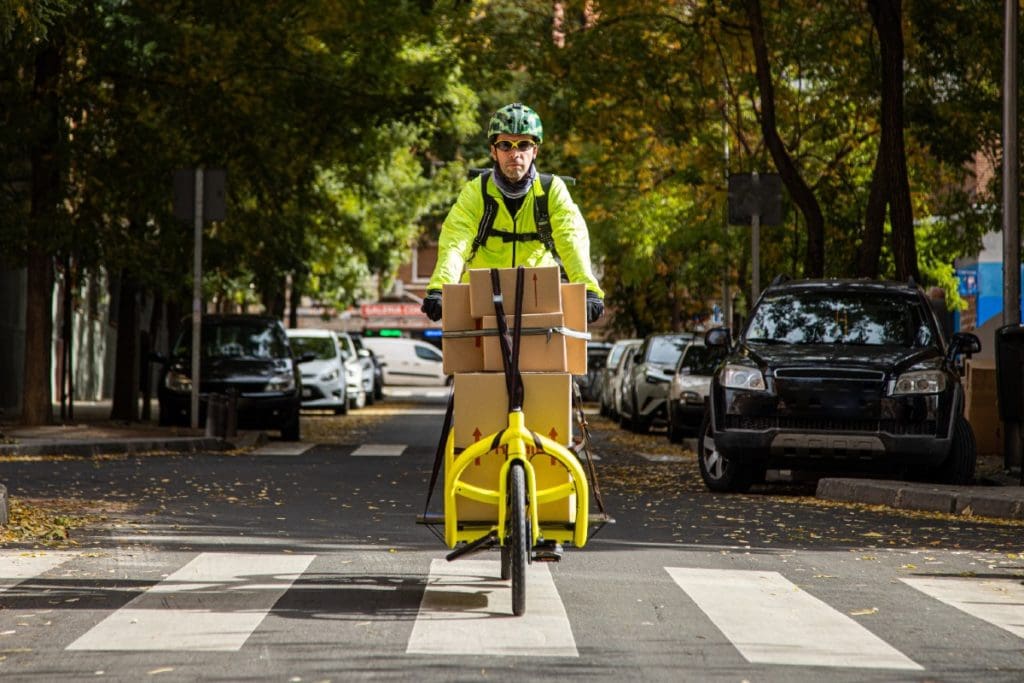UK’s Cargo Bike Boom – Will Australia Follow?

London, UK
A projected spike in cargo bike sales in the UK could be mirrored in Australia if the right infrastructure is put in place, according to Bicycle Industries Australia General Manager Peter Bourke.
The Bicycle Association of Great Britain (BAGB) has predicted cargo bike sales will increase by up to 60% in the UK during 2021/22.
It says approximately 4,000 cargo bikes were sold in the UK during the past year, with sales split evenly between commercial and private use.
A recent article in the Guardian newspaper quoted the BAGB and a number of major players in the UK cargo bike industry.
Raleigh UK’s commercial partnerships manager, Edward Pegram, estimates e-cargo bike sales will double in 2021 compared to 2020, following a 75% increase from 2019 to 2020.
Raleigh UK is among the nation’s best known bike brands and thinks e-cargo bikes will have one of the biggest growth trajectories during the next four or five years.
Raleigh’s UK managing director, Lee Kidger, predicts the UK cargo bike market will be 15 times its current level within five years.
Projections for a UK cargo bike boom are partially fuelled by a number of national and local initiatives to reduce carbon emissions and traffic congestion.
The BAGB helped the Government create a £2 million (A$3.72 million) e-CargoBike Grant scheme. A total of £400,000 (A$744,400) was made available by the Department for Transport in 2021/22 to purchase e-cargo bikes to support businesses switching to a sustainable transport solution.
The City of London leased 39 car parking spaces to Amazon for a last-mile logistics hub to act as a base for e-cargo bike and on-foot deliveries. It’s claimed the scheme will remove around 85 vans a day from local streets.
Hammersmith and Fulham Council, also in London, established a zero-emissions freight hub, Parcels Not Pollution, in 2019 and it is still operating.
Infrastructure essential for Australia
This type of infrastructure is vital in Australia for this country to achieve its potential with cargo bikes, according to Peter Bourke.
He says an ongoing Transport for NSW pilot, trialling a micro-distribution freight hub on the outskirts of the Sydney CBD, is highlighting the benefits and importance of well-planned infrastructure for micromobility.
“COVID has substantially reduced the amount of freight going into the CBD, with many people working from home, and the trial has been extended for that reason,” he said.
“In the short-term, we don’t think the framework is in place in Australia to achieve the type of cargo bike sales growth occurring elsewhere in the world. But we certainly believe cargo bikes have huge potential in Australia in the long term.
“COVID has certainly supercharged growth in infrastructure and courier companies are actively looking at introducing cargo bikes to their fleets.
“Dominos has identified the fastest way to deliver pizzas in many areas is with electric bikes.”
Mr Bourke said greater uptake in Australia would also require greater awareness among Australians about cargo bikes and their uses.
He said Melbourne-based company Lug & Carrie is racing to keep up with demand for its leased long-tail e-cargo bikes, targeting families and designed to carry children and small loads.
“And more than half of their customers are women, which is totally different to the general bike sales market,” he added.
Lug & Carrie, a pioneering e-cargo bike leasing business launched at the start of 2020, last month expanded into the Sydney market.
London Cargo Bike Deliveries Outpace Vans
A recent study by the UK’s University of Westminster found freight delivery services provided by cargo bikes in London are 60% faster than comparable deliveries performed by van while saving more than 14,500kg of CO2 and over 20kg of nitrous oxide COx annually.
“In central London, cargo bikes also had a higher average speed than vans, delivering nearly seven parcels an hour compared to four for vans,” according to the study’s fundings.
“These bikes also cut carbon emissions by 90% compared with diesel vans, and 33% compared with electric vans. As a result, cargo bikes can serve customers more effectively than vans without generating many of the negative effects on climate produced by urban freight.”
UK Supermarkets and construction companies are trialling the use of cargo and e-cargo bikes.
London dairy Jones Bros used Raleigh e-cargo bikes to trial food deliveries and the National Trust is using Raleigh e-cargo bikes to transport supplies and staff around 11 of its largest sites.
In addition, Pegram says companies such as food delivery services are starting to see cargo bikes as “fundamental to their business model”.
Join the Conversation
What will it take for Australia to fully embrace cargo bikes?
